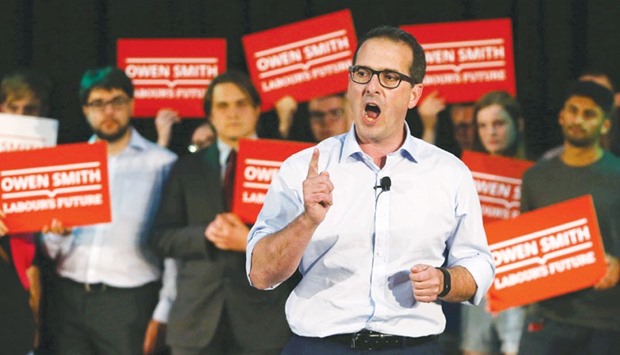Smith said he would replace the DWP with a ministry of labour and a department for social security, one of 20 policy promises he made in his speech in South Yorkshire, at the business park built by the Labour government on the site of the Orgreave colliery.
“I am determined that a Labour government I hope to lead will smash austerity, will end austerity. We will make an unbreakable promise to the British people to guarantee a better future,” he said.
The speech was partly overshadowed by remarks about the Prime Minister Theresa May, for which Smith later apologised, in which he said it pained him that Labour did not have “the strength, the power and the vitality to smash her back on her heels”.
After criticism of his comments, a spokesman said later: “It was off-script and, on reflection, it was an inappropriate choice of phrase and he apologises for using it.”
The policy pledges by Smith, whose campaign has been characterised by supporters of the Labour leader, Jeremy Corbyn, as “Blair-lite”, included leftwing economic policies that went significantly beyond the promises of the former leader Ed Miliband.
Those included plans to make zero-hours contracts unlawful, to end the public-sector pay freeze and to increase spending on the NHS by 4% in real terms every year of the parliament from 2020, with a commitment to bringing health service spending up in line with European averages.
He said he would re-instate the 50p top rate of income tax, reverse the cuts to corporation tax and inheritance tax, as well as create a new wealth tax on the top 1% of earners which he said would generate £3bn per annum.
The new tax would be a charge of 15% on unearned income and income from investment, only applying to those paying the additional rate of tax for earnings of £150,000 a year or more. “We had one of these before Thatcher scrapped it in the 1980s, and we need to re-introduce it. It’s time we asked the very wealthiest in our society to pay more.”
Smith was cagier when questioned on zero-hours contracts, which he had earlier said were “exploitative in their very essence and the hallmark of insecurity at work”. Asked what minimum hours would be required by law, he said: “You need to give people a contract to say, ‘here’s what you will be working’. It could be one, but I’m saying it shouldn’t be zero, we should invert that emphasis.”
The Corbyn campaign said Smith’s key policy pledge of creating a minister for Labour had in fact been announced by the shadow chancellor, John McDonnell, a month ago, as well as several near identical pledges made by Smith yesterday, such as repealing the trade union bill.
A spokesperson for Jeremy for Labour said: “Employment rights have been front and centre for McDonnell in the past 10 months as shadow chancellor and throughout his campaigning life. He launched the Institute of Employment Rights Manifesto for Labour Law on June 28, which included a policy to reinstate the ministry of labour. Corbyn has also proposed reinstating the ministry of labour, notably during last year’s leadership campaign.”
Smith said any policy on creating a new ministry of labour by Corbyn’s team had “passed me by, and I think it passed the country by ... it was a very sotto voce announcement, and truthfully, that’s the problem”.
He denied the idea ever having been raised in Corbyn’s cabinet when he was shadow secretary for work and pensions. “Jeremy has been going around the country saying he wants to end austerity without setting out at all how he wants to do it,” he said.
“Not once in the last nine months in which I served in the shadow cabinet have I heard a single debate being led by McDonnell about a minister for Labour or about rights at work. It has been devoid of ideas quite honestly.”
A campaign source later said: “McDonnell described the Institute of Employment Rights’ call for a ministry of labour only as a ‘contribution to the debate now underway’ and an ‘element of our policymaking process’. If he now full-heartedly supports it that is wonderful news.”
Throughout the speech, the rhetoric was pitched to those who would vote for his opponent, who has a clear lead in polls of Labour members, despite a damning national YouGov poll yesterday morning that suggested about 2.5mn people who voted Labour at the last general election now prefer the Tory leadership.

